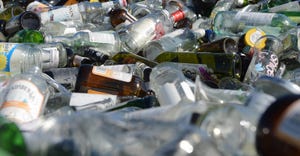Zero Waste Material Recovery Facility in Florida Seeks Complete Recycling
Citrus County, Fla., waste firm strives to create a zero waste MRF.
April 1, 2011
Ed Shomer
F.D.S. Disposal Inc., the largest waste hauler in Citrus County, Fla., is looking to bolster its recycling offerings by opening what it calls a “zero-waste recovered material processing facility.” The Lecanto, Fla., company already operates the only single-stream recycling service in the unincorporated areas of Citrus County through its subsidiary, Single Stream Processors Inc. (SSP).
F.D.S. owner William Ray says recycling in the county as a whole was limited until the company recognized what he calls “dynamic interest.” Residents were depositing a significant volume of recyclables at county drop-off centers. F.D.S., through SSP, rolled out subscription recycling services to its customers that almost immediately garnered 70 percent participation. The company anticipates that its entire serviceable customer base will be participating in single-stream recycling by the end of this year.
“Our hauling operation services over 34,000 residential accounts and has achieved remarkable participation results with [a single-stream pilot using large recycling totes instead of blue bags rolled out to] just 1/5 of its subscription residential service, diverting an estimated 135 tons per month from the landfill,” says F.D.S. Disposal president (and William’s mother) Ina Ray. She attributes the success to the company’s in-depth customer education programs and alliances with a number of municipal agencies and regional environmental groups.
“Our curbside blue bag program reached new heights when we asked our customers what they wanted, provided more in-depth education and went from a blue bag program to 48 gallon totes,” says Ina Ray, noting that the changes led to a 125 percent increase in single-stream tonnage in the trial area. She says the company expects to divert 650 to 1,000 tons per month from disposal once the education program and totes are rolled out to their entire customer base.
That embrace of recycling is what drove the company to acquire the real estate and recycling equipment to construct what it believes will be the only single-stream materials recovery facility (MRF) in the nation to send zero waste to a landfill. In pursuit of this goal, F.D.S. formed a series of partnerships. The first was between its subsidiary SSP and American Cierra Equipment Inc., a recycling equipment company based in Auburn, N.Y.
The partnership has yielded a process where desirable metals, plastics, paper, glass and other recyclables are sorted for traditional recycling, while the residual waste — butter tubs, microwave trays and other low demand or unmarketable recyclables — will be treated by a patented process, then compressed and molded to make products such as plastic lumber, fencing, flooring and plastic pallets. William Ray says the cost over the life of these recycled products is very competitive when compared with conventional wood products. Recycled plastic pallets are far more durable and easier to maintain than their wood counterparts, he says.
“’Total recycling’ is a big vision, a vision I have had since 1998 when I began in the waste business,” William Ray says. “Even back then, I had my customers recycling aluminum cans and newsprint. This means recycling 100 percent of our waste and not wasting anything. As we understand it, we will become the only zero waste MRF in the nation. It means practical, economic, effective reuse of anything that we would normally discard.”
Another partnership between SSP and East Greenwich, R.I.-based Peninsula Compost Group addresses the organic component of the waste stream. Peninsula owns and operates one of the largest food and yard waste composting facilities on the East Coast, the Wilmington Organics Recycling Center in Wilmington, Del., which processes up to 600 tons per day of organic waste from the mid-Atlantic region.
“Peninsula was seeking opportunities in Florida,” William Ray says. “Our biodigester, combined with our strategic location, afforded a natural fit for both organizations.” Through the partnership, Peninsula will provide future capital, consulting and additional equipment as needed.
With the help of Peninsula and an affiliated company, Waste Options of Nantuckett, Mass., FDS recently purchased from the Sumter County (Fla.) Board of Commissioners a biodigester measuring 185 feet long and 15 feet in diameter.
“The rotary biodigester is a proven, efficient tool for efficiently pre-processing organics for composting,” says Peninsula managing director and co-founder Charles Gifford. “In combination with the GORE Cover system for composting, which we use in Wilmington, it is an elegant, state-of-the-art solution for organic materials conversion into high-quality compost and soil products.”
Peninsula and Waste Options are well-versed in the use of biodigesters and have been operating their large-scale digester on Nantucket for the past 10 years to process the entire island’s organic waste.
“Zero waste is an achievable goal in Florida with the combination of aggressive recycling techniques and modern, efficient composting,” Gifford says. “Our Nantucket experience, where we have already achieved an over 92 percent recycling rate as well as generating carbon offset credits, has proven that.”
“This process adds another dimension to our zero waste goals,” says Randy Messer, government affairs manager for F.D.S. and SSP. “Zero or low demand recyclables such as wax-coated corrugated cardboard, napkins and paper plates can also be incorporated into this process, reducing yet again the amount of material typically bound for disposal facilities.”
William Ray says F.D.S. wants to create opportunities for participation on all levels. Viable food wastes are abundant from schools, multi-family residential communities, and special events facilities, he says, enabling more possible partnerships. F.D.S. expects the supply of quality compost derived from this operation will support agriculture industries in the surrounding areas, reducing the need for chemical fertilizers and encouraging sustainable farming practices.
F.D.S.’s automated sort line and baling operation began operating in January. The company anticipates having its biodigester online within six to 12 months and the plastic extrusion operational by the end of 2012. The company says hopes to send zero waste to the landfill by 2013.
“The synergies created with our triad of companies working in concert towards a common goal of zero waste to the landfill — we believe [this] will place us in the very near future with the pioneers and visionaries of the waste industry,” says Messer.
William Ray adds, “As our mascot, Maxwell the Manatee, says ‘The tides are a changing.’”
Ed Shomer is vice president of municipal recycling operations for F.D.S. Disposal Inc. in Lecanto, Fla.
Related Stories
You May Also Like
.png?width=300&auto=webp&quality=80&disable=upscale)

